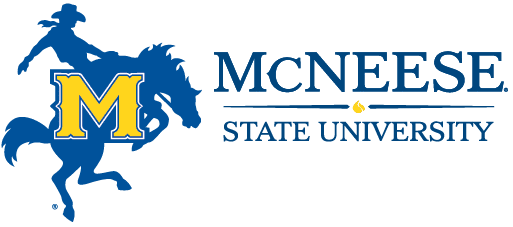Table of Contents
Fiscal Responsibility
Addressing enrollment, both student recruitment and retention, was a priority for the new administration. Tuition and fees generated by student enrollment have become a significant portion of the operating budget in recent years.
In 2017, nearly 62% of the public four-year degrees earned by students (an average of 1,400 graduates each year) from the five parishes that comprise Southwest Louisiana were from McNeese.
Yet, state funding for McNeese had dropped from $29.3 million in 2011 to $16.7 million in 2017 - a 43% decrease. McNeese could no longer rely on state funding to support its operations.
With student tuition the primary source of revenue, enrollment, both recruiting students and retaining students, became the top priority. A plan with goals and strategies to increase enrollment was underway, but “seed money” was needed immediately to support growing academic programs, upgrade science, engineering, and nursing labs, strengthen retention efforts, and enhance campus facilities.
The funding model would need support from private and corporate donors for McNeese to sustain growth and grow enrollment for self-sufficiency.
In 2018, Dr. Burckel engineered an innovative, three-year plan to partner with local businesses and industry to generate funds that could be used immediately to meet academic program needs and infrastructure demands.
Gov. John Bel Edwards and state and local officials attended an event in Lake Charles to celebrate economic development initiatives in Southwest Louisiana and to officially launch the McNeese First Choice Campaign. During the event, Waste Management made the first donation of $60,000 to the campaign.
“Industry and private partners invested in McNeese and the future of Southwest Louisiana through the First Choice Campaign and that allowed us to hire faculty, upgrade aging classrooms and labs, and address facility and infrastructure needs throughout the campus,” Dr. Burckel explained.
The McNeese First Choice Campaign raised more than $2.6 million.
The athletics program was also impacted by a shift in funding resources. Dr. Burckel worked with the McNeese Foundation to reinstate the McNeese Athletic Foundation (MAF) in early 2020, with the goal of making athletics self-supporting and moving athletics funding completely out of the university operating budget.
He said, “The purpose of the McNeese Athletic Foundation is to promote and raise funds to maintain and strengthen the entire athletic program and to provide resources that support the over 400 student-athletes competing in 15 NCAA sports. Our vision is to make McNeese First Choice in every effort, endeavor, and experience. Building and sustaining a high-quality athletic program that inspires our student-athletes to compete at their optimal performance in the classroom and on playing fields will require sufficient funding for scholarships, academic support, health and wellness programs, and excellent facilities and equipment.”
Dr. Burckel worked to change the structure of athletics to coordinate fundraising efforts more closely with the Office of University Advancement. The athletics department would no longer use a third-party company to seek and secure sponsorships. This decision was a game changer and has paid tremendous dividends. McNeese Athletics is on the path to become self-sustaining.
He steered the University through the trials of the COVID-19 pandemic and a succession of natural disasters in 2020 and 2021.
Damages, losses, and remediation work from Hurricanes Laura and Delta topped over $230 million to the McNeese campus, but campus operations to deliver academic instruction and to process payroll and operational expenses never ceased despite numerous campus closures.
The devastating 2020 hurricanes resulted in more than physical damage. They created a substantial decline in enrollment resulting in a loss of revenue that created a profound impact on the operating budget. Using a combination of revenue generation and reductions in expenses, Dr. Burckel and his team erased a deficiency in the operating fund and balanced the budget, leaving the remainder of a one-time state appropriation available as needed.
Over the past seven years, capital improvement projects totaling more than $87 million were completed under Dr. Burckel’s administration with funding from the state, private sources, and University capital funds. Currently $145 million in capital improvement projects are in various stages of planning, design, or construction.
New facilities underway include a student union, bookstore and fan zone, press box and suites at Cowboy Stadium, the McNeese LNG Center of Excellence, farm buildings and labs, and a baseball field house. These, and other significant infrastructure improvements, will transform the campus within the next 18-24 months.
Other fundraising initiatives included:
- Securing a sponsorship from First Horizon Bank (then Iberia Bank) to support the President’s Awards, cash awards presented annually to faculty who demonstrate excellence in teaching, research, scholarly activity, and campus and community service and to staff who exhibit excellence in customer service, campus leadership, and community service.
- Receiving the largest planned gift in McNeese history, a $9 million donation from the estate of Dr. Francis X. Bride. The bequest established an endowed professorship and student scholarships in science and health professions.
- Receiving a $1 million donation from the estate of Dorothy Brammer Hanna to establish four endowments - the W.A. and Dorothy Hanna Endowment, W.A. and Dorothy Hanna Endowment for “Messiah,” W.A. and Dorothy Hanna Endowment for Education and the W.A. and Dorothy Hanna Endowment for Performing Arts.
- Creating Public-Private Partnerships to build the Student Health and Counseling Center and the McNeese LNG Center of Excellence, create a study lab for engineering and computer science majors, and refurbish classrooms.

